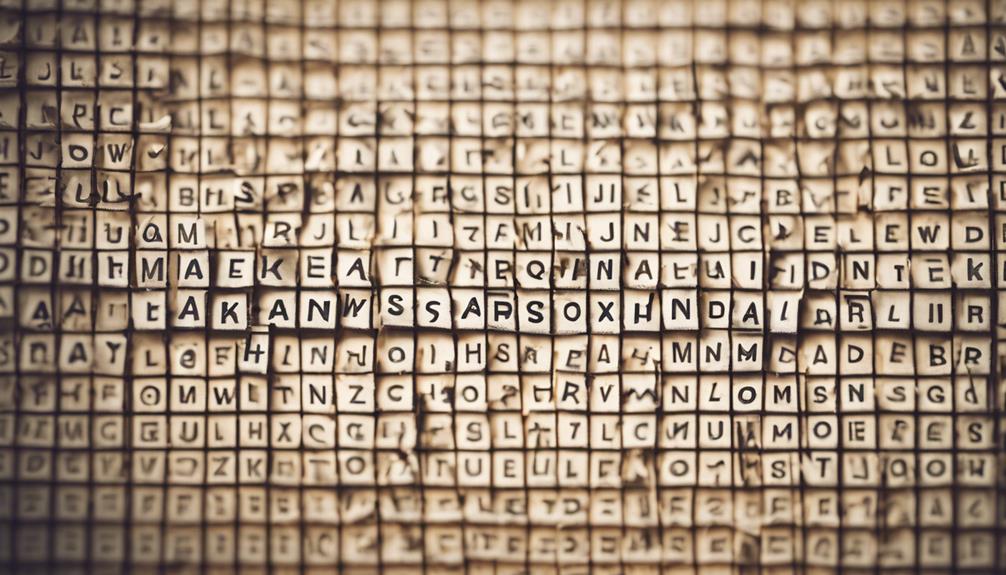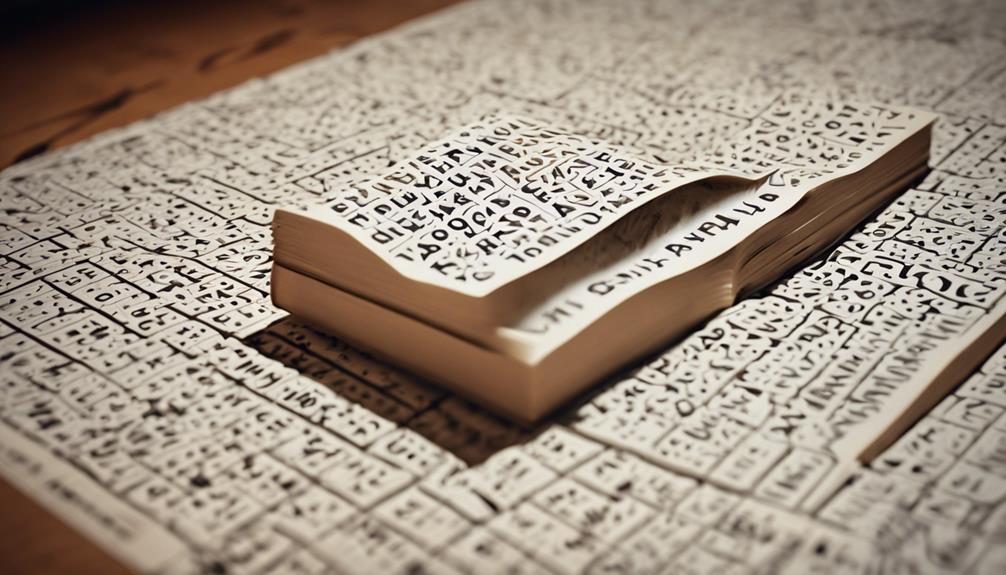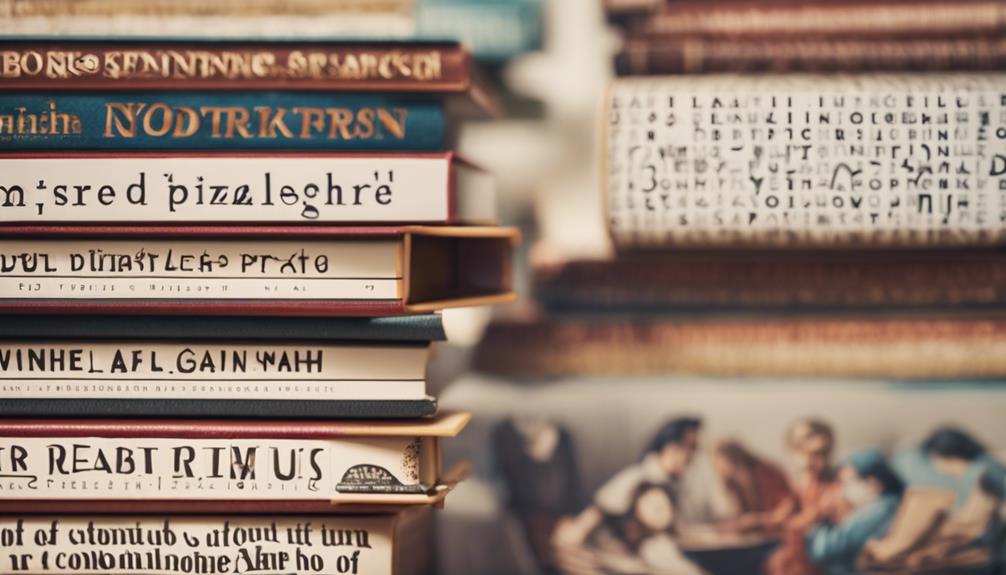Imagine classic literature as a vast and intricate tapestry, waiting to be unraveled through the lens of a word search puzzle. Just as a skilled weaver intertwines threads to create a masterpiece, adapting timeless works into word searches requires careful consideration and artistry.
As you explore the fusion of beloved novels with the challenge of finding hidden words, you'll discover a new dimension to these literary treasures. But how can you effectively capture the essence of a novel within the confines of a puzzle grid?
Stay tuned to unravel the secrets of crafting engaging and immersive literary word search puzzles.
Key Takeaways
- Enhance puzzle content with diverse literary themes and characters.
- Tailor difficulty levels to engage and challenge solvers effectively.
- Utilize digital platforms for sharing interactive and visually appealing puzzles.
- Balance creativity, complexity, and distribution for an enjoyable solving experience.
Benefits of Literary Word Searches

By engaging in literary word searches, readers can enhance their vocabulary and critical thinking skills, fostering a deeper appreciation for classic literature. These puzzles serve as a fun and interactive way to increase your vocabulary while also improving memory retention. As you search for words related to classic novels, you not only learn new terms but also reinforce the ones you already know.
🌊 Discover Endless Fun with Beachcomber Press Puzzle Books! 🌊
Elevate your puzzle game with our captivating collection on Amazon.
Perfect for all ages, our books are packed with unique
challenges that promise hours of entertainment.
Diverse puzzles for every skill level High-quality, engaging content
The act of deciphering word search puzzles requires you to pay close attention to detail, honing your critical thinking abilities. By identifying and connecting words from classic literature, you're actively engaging your mind and improving your cognitive skills. This mental exercise can have a lasting impact on your memory, helping you retain information more effectively.
As you delve into literary word searches, you aren't just solving a puzzle; you're embarking on a journey that enriches your linguistic repertoire and boosts your cognitive functions. Embrace the challenge, and reap the rewards of expanding your vocabulary and enhancing your memory through these engaging puzzles.
Selecting Classic Novels for Puzzles
To create engaging word search puzzles, carefully selecting classic novels with rich and diverse vocabulary sets the foundation for an enriching puzzle-solving experience. When choosing classic novels for your word search puzzles, consider the following:
- Creating themed puzzles: Select novels that fit a specific theme, such as detective stories, romance, or adventure, to add an extra layer of excitement to the puzzle-solving experience.
- Utilizing famous quotes: Incorporate well-known quotes from the selected novels as hidden words in the puzzle, adding a fun and recognizable element for enthusiasts of classic literature.
- Exploring diverse genres: Include novels from various genres like science fiction, mystery, and gothic literature to cater to a wide range of puzzle solvers with different literary tastes.
- Balancing difficulty levels: Mix novels with varying levels of complexity in terms of vocabulary and word length to challenge puzzlers of all skill levels and keep them engaged.
Designing Engaging Puzzle Grids

Crafting visually appealing and challenging puzzle grids is essential to enhancing the overall experience for word search enthusiasts. When designing your puzzle grids, focus on grid layout creativity to engage solvers effectively. Experiment with different shapes and patterns to keep solvers intrigued and motivated. Consider incorporating themed elements within the grid to establish visual appeal and make thematic connections with the literature being featured.
To create an engaging puzzle grid, think about how the placement of words can influence the overall look and feel of the puzzle. Arrange words strategically to avoid overly congested areas while maintaining a balanced distribution throughout the grid. This balance not only enhances the visual appeal but also ensures that solvers can navigate the puzzle smoothly without feeling overwhelmed.
Incorporating Characters and Themes
As you progress in designing your word search puzzles, consider infusing characters and themes to elevate the puzzle-solving experience and deepen the connection to the classic literature being reimagined. When incorporating character traits, think about the personalities and qualities that define each character. This adds depth to the puzzle by allowing solvers to connect not only with the story but also with the individuals within it.
Themes and motifs in puzzles serve as guiding threads, weaving through the words and offering a thematic exploration as solvers search for them. Here are some ways to effectively incorporate character traits, themes, and motifs in your word search puzzles:
- Integrate key character names as hidden words to spark recognition and association.
- Include thematic words related to the central ideas of the classic literature to enhance the overall puzzle experience.
- Utilize character traits as clues to help solvers identify words linked to specific characters.
- Create a cohesive narrative within the puzzle by arranging words that reflect the themes and motifs of the original work.
Adding Hidden Words Strategically

Strategically placing hidden words within your word search puzzle can enhance the challenge and engagement for solvers. When considering strategic placement, think about the flow of the puzzle. Start by scattering themed word choices throughout the grid, ensuring they intersect at various points. This creates complexity and keeps solvers actively searching for connections between words.
To optimize engagement, strategically place longer words that span multiple rows or columns. This forces solvers to think critically about word orientation and increases the difficulty level organically. Additionally, consider placing themed words diagonally or backwards for an added layer of challenge.
When selecting themed word choices, think about the relevance to the classic literature being adapted. Including key character names, significant locations, or pivotal plot points can elevate the puzzle's connection to the source material. This not only adds depth to the word search but also invites solvers to immerse themselves in the world of the literary work as they search for hidden words.
Enhancing Puzzle Difficulty Levels
Enhancing the difficulty levels of your word search puzzle involves thoughtful placement of challenging words and creative design elements to engage solvers further. To increase complexity and challenge solvers effectively, consider the following strategies:
- Mix Difficulty Levels: Blend easy, intermediate, and difficult words to cater to a variety of solver skill levels.
- Incorporate Twists: Add diagonal, backward, or overlapping words to introduce an element of surprise and keep solvers on their toes.
- Include Unexpected Words: Integrate words related to the theme that may not be commonly associated with it, providing an extra layer of challenge.
- Vary Word Lengths: Use short and long words interchangeably to prevent solvers from falling into predictable patterns and make the puzzle more engaging.
Tips for Solving Literary Puzzles

To excel at solving literary puzzles, focus on analyzing the context and themes of the literature to guide your word search strategy effectively. Improving focus and memory retention is key when tackling these puzzles.
🌊 Discover Endless Fun with Beachcomber Press Puzzle Books! 🌊
Elevate your puzzle game with our captivating collection on Amazon.
Perfect for all ages, our books are packed with unique
challenges that promise hours of entertainment.
Diverse puzzles for every skill level High-quality, engaging content
Start by carefully reading the title and any hints provided to grasp the central theme. This will help you anticipate the words likely to be included. Enhancing vocabulary and critical thinking skills is another crucial aspect.
As you search for words, pay attention to synonyms, related terms, or even character names that might be hidden in the grid. Keep in mind the setting, characters, and plot points of the literary work to aid in your search.
Additionally, consider the emotions or moods evoked by the text, as these can offer clues to word placement. By engaging with the literature on a deeper level, you can enrich your puzzle-solving experience while honing your analytical skills.
Customizing Puzzles for Readers
For a tailored and engaging experience, consider customizing word search puzzles to cater to the specific interests and preferences of your readers. When creating puzzles based on literary classics, personalizing the challenges can enhance the overall puzzle-solving experience. Here are some tips to help you customize puzzles for your readers:
- Personalized Challenges: Tailor the difficulty level of the word search by adjusting the number of words, their orientation, and the complexity of the grid to match the skill level of your audience.
- Reader Preferences: Take into account your readers' favorite genres, authors, or specific works of classic literature to create puzzles that resonate with their interests.
- Engaging Adaptations: Incorporate elements from the original texts, such as character names, quotes, or significant plot points, to make the puzzles more engaging and meaningful for readers.
- Literary Classics: Choose timeless works of literature that are well-known and beloved by many to ensure your puzzles appeal to a broad audience while maintaining a high level of interest and challenge.
Sharing and Printing Puzzle Collections

Consider utilizing digital platforms or professional printing services to efficiently share and produce your curated collection of word search puzzles based on classic literature. For online distribution, platforms like Canva or Puzzle-Generator can help you create and share your puzzles with a global audience. These platforms offer templates and customization options to make your puzzles visually appealing. If you prefer physical copies, professional printing services like Vistaprint or Printful can assist in producing high-quality prints of your puzzle collection. Here's a comparison table to help you decide on the best sharing and printing options for your puzzle collection:
| Online Distribution Platforms | Print Options | Sharing Options |
|---|---|---|
| Canva | Vistaprint | |
| Puzzle-Generator | Printful | Social Media |
| Website Embed |
Exploring Interactive Puzzle Platforms
Explore the interactive puzzle platforms available to engage audiences with dynamic and immersive word search experiences based on classic literature. When considering the best platform for your word search puzzles, compare the following features to ensure an interactive and engaging experience:
- Puzzle Platform Comparison: Evaluate different platforms for their ease of use, variety of customization options, and compatibility with different devices.
- Interactive Features: Look for platforms that offer interactive elements such as timed challenges, hints, and sound effects to enhance the puzzle-solving experience.
- User Engagement: Choose a platform that encourages user engagement through features like leaderboards, sharing options, and community forums.
- Puzzle Feedback Integration: Opt for platforms that allow users to provide feedback on the puzzles, enabling you to improve and tailor future word search experiences to their preferences.
Frequently Asked Questions
How Do Word Search Puzzles Benefit Cognitive Skills in Individuals?
Word search puzzles can enhance cognitive skills by stimulating critical thinking and problem-solving abilities. They aid memory retention through engagement with words and promote mental acuity. Embrace these puzzles for a liberated mind.
Can Word Search Puzzles Based on Classic Literature Help Improve Vocabulary and Reading Comprehension?
Imagine delving into timeless tales through word search puzzles. Your vocabulary expands as you seek hidden words. Engage with the text, enhancing reading comprehension and cognitive skills. Analyzing literary elements becomes an enjoyable challenge.
🌊 Discover Endless Fun with Beachcomber Press Puzzle Books! 🌊
Elevate your puzzle game with our captivating collection on Amazon.
Perfect for all ages, our books are packed with unique
challenges that promise hours of entertainment.
Diverse puzzles for every skill level High-quality, engaging content
How Do You Ensure That the Difficulty Level of a Literary Word Search Puzzle Is Suitable for a Wide Range of Readers?
To ensure a literary word search puzzle suits various readers, customize difficulty levels. Engage all with hints and clues that guide without giving away answers. Tailor the experience for exploration and satisfaction.
Are There Any Specific Strategies for Incorporating Lesser-Known Characters or Themes From Classic Novels Into a Word Search Puzzle?
When incorporating lesser-known characters or themes from classic novels into a word search puzzle, you can delve into character relationships and analyze symbolic motifs. This creative approach offers readers a fresh perspective on literary works.
What Are Some Innovative Ways to Share and Distribute Literary Word Search Puzzles Beyond Traditional Print Formats?
To expand your reach beyond print, consider utilizing digital platforms like interactive websites. Engage with a wider audience by sharing puzzles on social media and online communities. Embrace the digital age's potential for literary puzzle distribution.
Conclusion
As you delve into the world of literary word search puzzles, you'll uncover hidden treasures of classic novels waiting to be discovered.
With carefully selected novels, engaging puzzle grids, and strategic word placements, you can challenge your mind and immerse yourself in beloved stories like never before.
So, grab a pencil and embark on a journey through the pages of literature, where every word you find adds to the rhythm and flow of your puzzle-solving adventure.

